Georgia country profile
- Published
This page is no longer being updated. It was last updated on 31 December 2024

Situated at the strategically important crossroads where Europe meets Asia.
Over the centuries, Georgia was the object of rivalry between Persia, Turkey and Russia, before being eventually annexed by Russia in the 19th Century.
Since emerging from the collapsing Soviet Union as an independent state in 1991, Georgia has again become the arena of conflicting interests.
Tense relations with Russia after the 2003 "Rose Revolution" were further exacerbated by Moscow's support for the breakaway regions of Abkhazia and South Ossetia, leading to a brief war in 2008.
But since Russia's 2022 invasion of Ukraine the government has shifted away from the West.
The governing Georgian Dream party has become increasingly authoritarian, passing Russian-style laws targeting media and non-government groups who receive foreign funding, and the LGBT community.
Georgia had been granted EU candidate status in 2023 but its path to membership has faltered as EU leaders said the media law amounted to "backsliding" by Tbilisi. The country has seen continuing protests since the disputed 2024 parliamentary elections.
Under the law, media and non-governmental organisations receiving over 20% of their funding from abroad have to register as "organisations acting in the interest of a foreign power" and submit to stringent audits or face punitive fines.
Read Abkhazia profile
Read more country profiles, external - Profiles by BBC Monitoring, external
REPUBLIC OF GEORGIA: FACTS
Capital: Tbilisi
Area: 69,700 sq km
Population: 3.7 million (excluding breakaway regions)
Languages: Georgian
Life expectancy: 69 years (men) 78 years (women)
LEADERS
President: Mikheil Kavelashvili
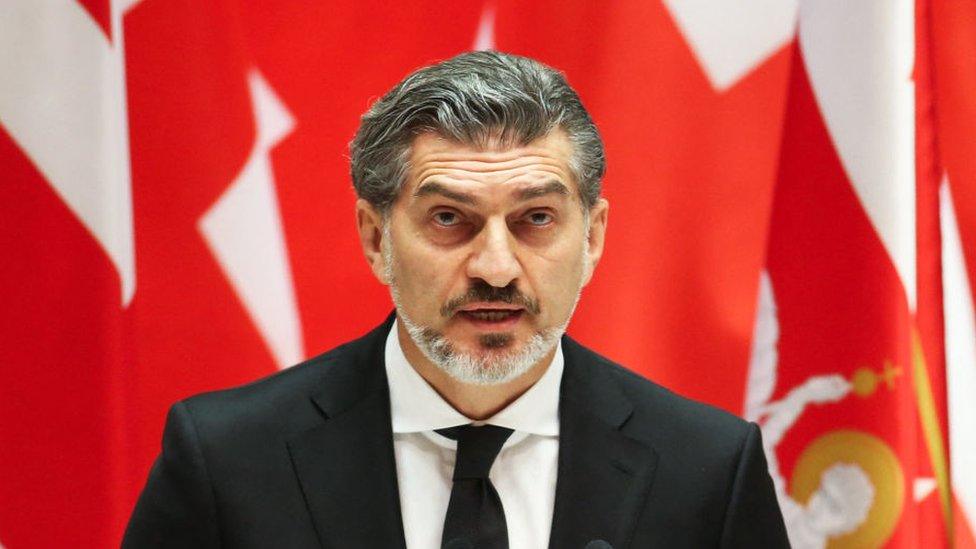
Mikheil Kavelashvili, a former Manchester City footballer, was appointed president by Georgia's disputed parliament in December 2024.
He is an MP from the increasingly authoritarian ruling Georgian Dream party and was the only candidate for the job.
Kavelashvili's presidency is not recognised as legitimate by the opposition and by the previous president, the pro-Western Salome Zourabichvili, who say the electoral college that chose Kavelashvili had no standing because the 2024 October parliamentary election was rigged.
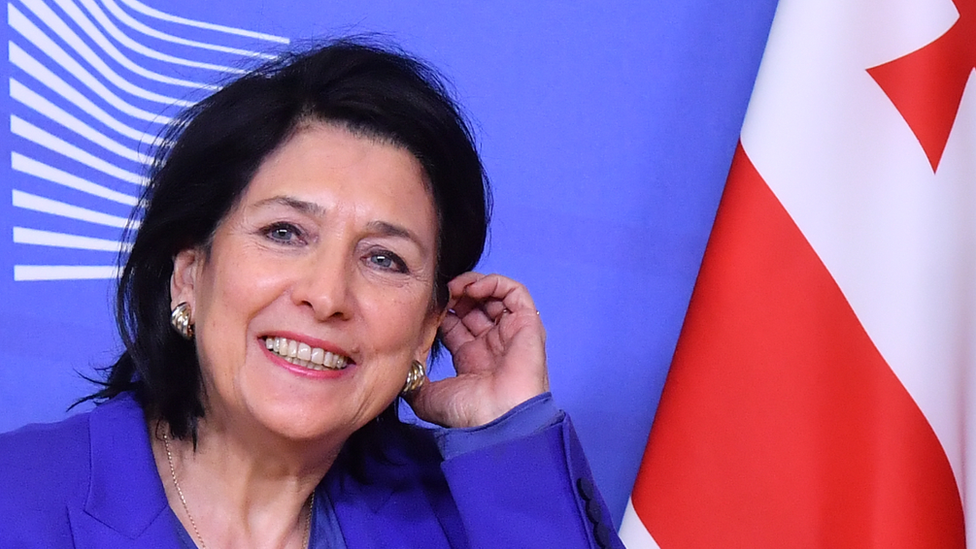
Salome Zourabichvili has refused to leave office
Outgoing President Salome Zourabichvili, Zourabichvili has refused to leave office. "I am here and will remain here," Zourabichvili was quoted as saying and deploring Kavelashvili's election as a "provocation" and "parody".
She has fallen out with the government over its lukewarm support for Ukraine amid the Russian invasion, the EU, and the "foreign agents law".
Prime Minister: Irakli Kobakhidze
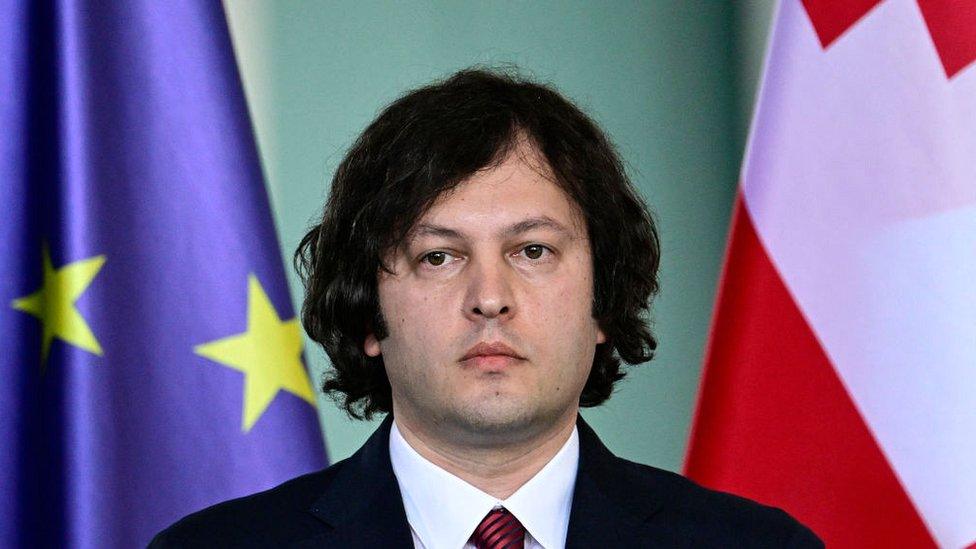
Irakli Kobakhidze, of the Georgian Dream party. was nominated by parliament as prime minister in February 2024 following the resignation of Irakli Gharibashvili.
Results from the October 2024 elections by Georgia's election commission gave the ruling Georgian Dream party an outright majority of 54% - despite exit polls for opposition TV channels suggesting four opposition parties had won.
Election observers had complained of an "uneven playing field" in the election, suggesting the scale of vote violations may have affected the result. The US and EU have backed calls for an independent investigation.
Kobakhidze rejected allegations of vote-rigging and violence and said that "irregularities happen everywhere, in every country."
Ahead of the election, Georgian Dream's billionaire founder, Bidzina Ivanishvili stoked up anti-Western rhetoric and accused an unidentified "global war party" of aiming to drag his country into the war in Ukraine.
His unfounded claims have led to fears his party is adopting Russian-style laws and returning to Russia's sphere of influence, after the five-day 2008 war in which Russian troops invaded Georgia.
Russian commentators widely welcomed Georgian Dream's victory as an indication that Georgia will begin to pivot back to Moscow.
MEDIA
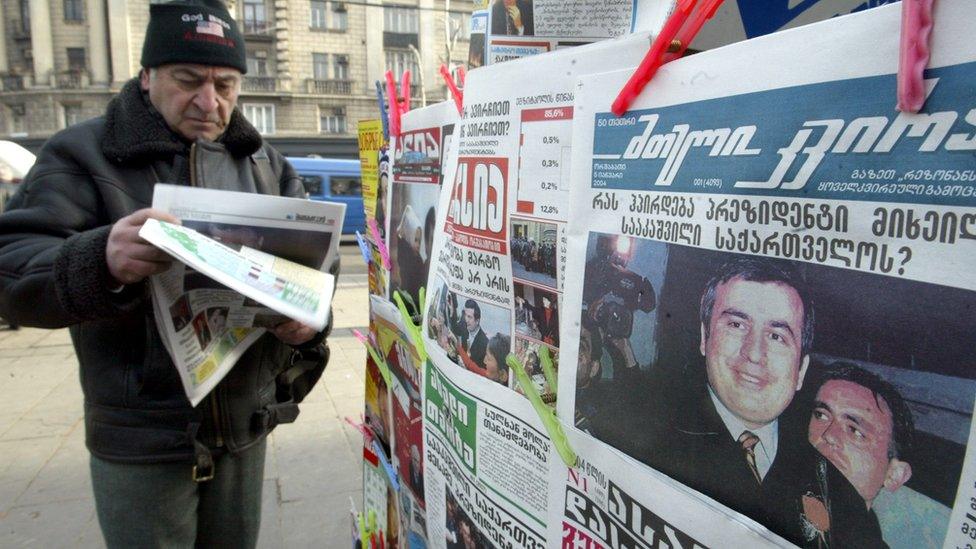
Television is the most popular medium although online media are gaining ground as news sources.
In 2024, Georgia introduced its contentious "transparency on foreign influence" bill - often dubbed the "foreign agents law".
The Georgian government argues it will ensure transparency of money flowing to support NGOs and protect Georgia from foreign interference.
Opponents say the real reason for the legislation is to stifle dissent.
Read full media profile
TIMELINE
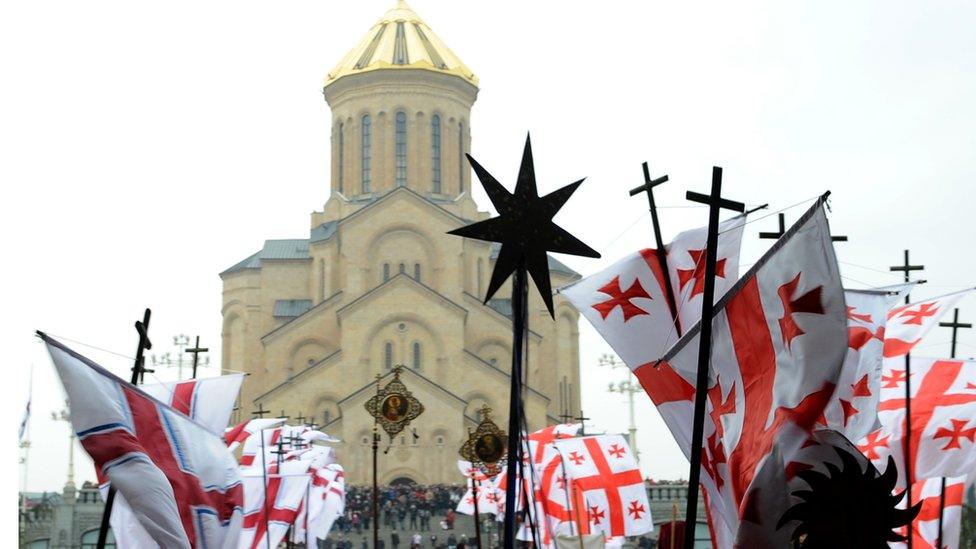
A religious procession outside Tbilisi's Holy Trinity Cathedral
Some key dates in Georgia's history:
11th Century - Georgian kingdom becomes politically unified under the Bagrationi dynasty.
12th-13th Centuries - Kingdom of Georgia reaches its zenith during the reigns of David IV (reigned 1089-1125) and his great-granddaughter Tamar (reigned 1184-1213).
c. 1220-1330s - Mongol invasions and occupations of the Caucasus.
1299-1302 - George V of Georgia defeats the Mongols and restores the Georgian kingdom. After his death, Georgia disintegrates politically and collapses by the 15th Century.
16th-18th Centuries - Safavid Iran (and successive Iranian Afsharid and Qajar dynasties) and Ottoman Turkey subjugate the eastern and western parts of Georgia.
1801-1804 - Most of present-day Georgia becomes part of the Russian Empire.
1879 - History's best-known Georgian, future Soviet leader Iosif Dzhugashvili (Joseph Stalin), is born in the town of Gori.
1918 - Independent Georgian state declared in wake of Russian Revolution.
1921 - Red Army invades, Georgia absorbed into emerging Soviet Union.
1956 - Protests against Soviet leader Nikita Khrushchev's de-Stalinisation policy turn violent and prompt calls for secession from the USSR; they are brutally crushed by Soviet forces.
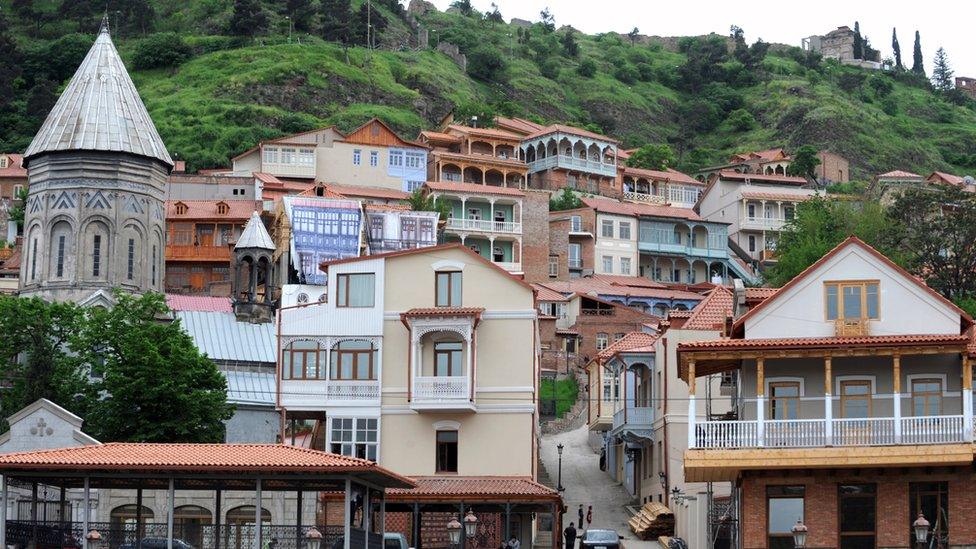
Houses in old Tbilisi
1989 - Pro-independence protests crushed by Soviet troops in Tbilisi resulting in 21 deaths. Demands for more autonomy in South Ossetia lead to violent clashes between Georgians and Ossetians. Soviet - later Russian - peacekeepers are deployed.
1991 - Georgia declares its independence and Zviad Gamsakhurdia is elected president. He is deposed in a coup and a brief civil war lasts until 1993.
1990-92 - After several outbreaks of violence, South Ossetia declares its intention to secede and proclaims independence in 1992. Sporadic violence continues until agreement on the deployment of Georgian, Ossetian and Russian peacekeepers is reached.
1992-93 - Georgia-Abkhazia War: Georgia sends troops to Abkhazia to halt secession moves. Fierce fighting ends with Georgian forces being expelled from Abkhazia. Up to 30,000 people are killed. Before the war Georgians make up nearly half of Abkhazia's population but up to 250,000 Georgians and others are expelled, virtually halving Abkhazia's population.
1994 - Georgian government and Abkhaz separatists sign a ceasefire agreement, paving the way for the deployment of a Russian peacekeeping force.
2001- Clashes in Abkhazia between Abkhaz troops and Georgian paramilitaries backed by fighters from the North Caucasus. The tension is heightened as Russia accuses Georgia of harbouring Chechen rebels, a charge dismissed by Georgia.
2003 - Staunchly pro-Western leader Mikhail Saakashvili comes to power as a result of the Rose Revolution after President Eduard Shevardnadze resigns following protests over alleged election fraud.
2004 - Several deaths are reported in clashes between Georgian and South Ossetian forces.
2006 - South Ossetians vote in favour of independence in an unrecognised referendum.
2008 - Tensions between Georgia and Russia escalate into a full-blown war after Georgia tries to retake South Ossetia. Russian forces push Georgian troops out of South Ossetia and Abkhazia. After five days of fighting the two sides sign a French-brokered peace agreement. Russia recognises both South Ossetia and Abkhazia as independent states - very few other countries do.
Russia says it will keep a military presence in Abkhazia and South Ossetia.
2014 - EU and Georgia sign an association agreement - a far-reaching trade partnership deal.
2015 - Russian forces in South Ossetia move internal border 1.5km further inside Georgia proper, threatening main road linking west and east of country.
2017 - South Ossetia holds presidential election and a referendum on changing its name to the State of Alania as part of a plan to join the Russian Federation.
2022 - Following Russia's invasion of Ukraine, Georgia becomes a temporary home for many Russian exiles.
2023 - Prime Minister Irakli Gharibashvili draws domestic and international criticism for saying Nato enlargement was one of the main reasons for Russia's invasion of Ukraine.
Georgia gains EU candidate status.
2024 - EU puts Georgia's membership path on hold after Georgia introduces a controversial "transparency on foreign influence" law.
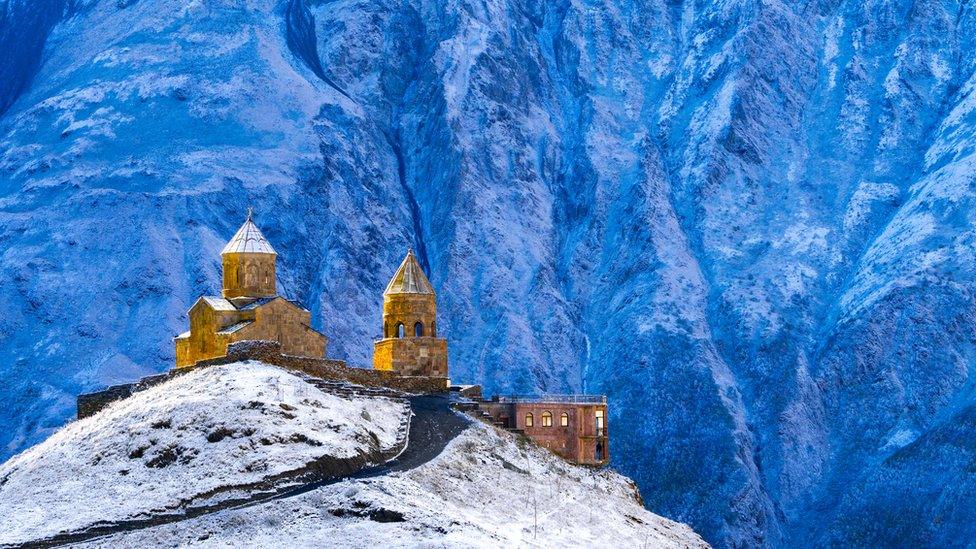
Georgia converted to Christianity in the 4th Century
Related topics
- Published25 March 2024

- Published19 November 2024
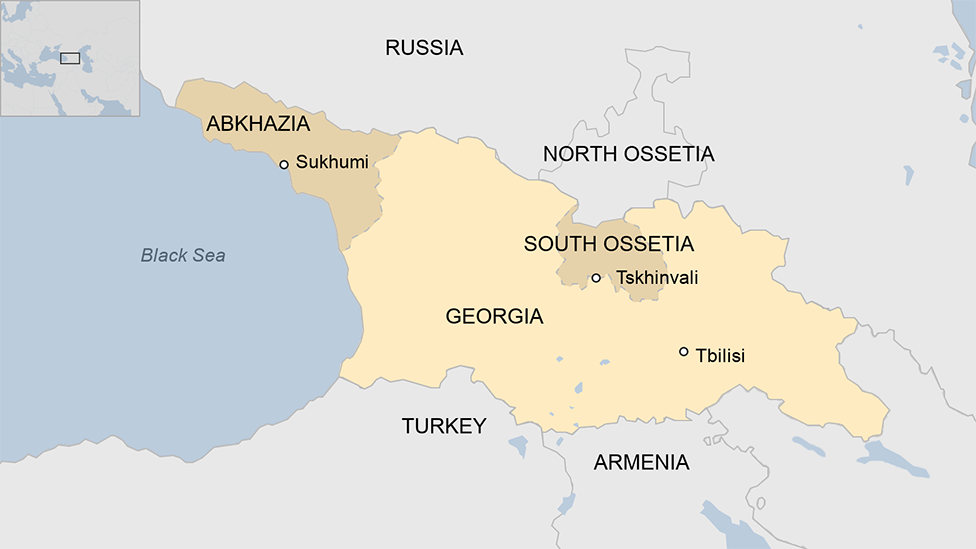
- Published25 October 2024

- Published17 October 2024
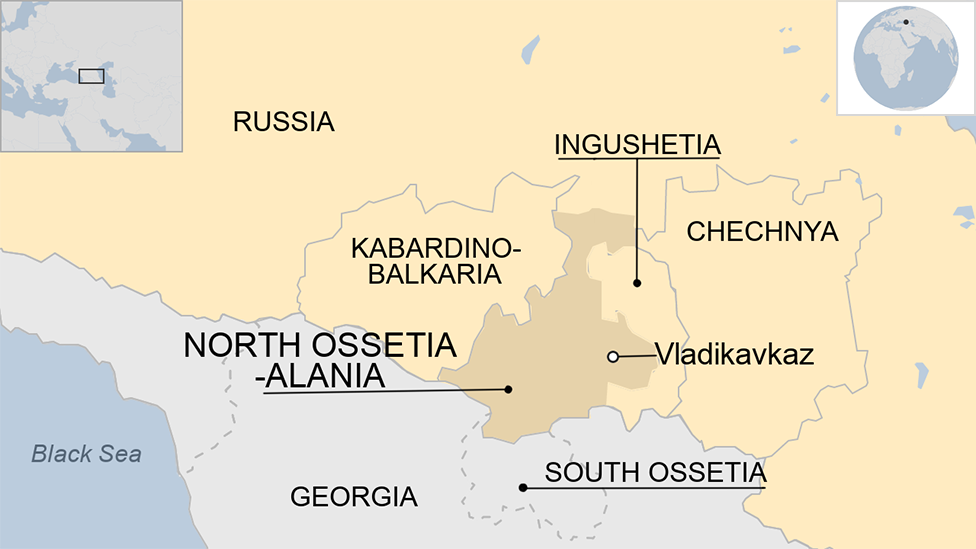
- Published13 February 2024
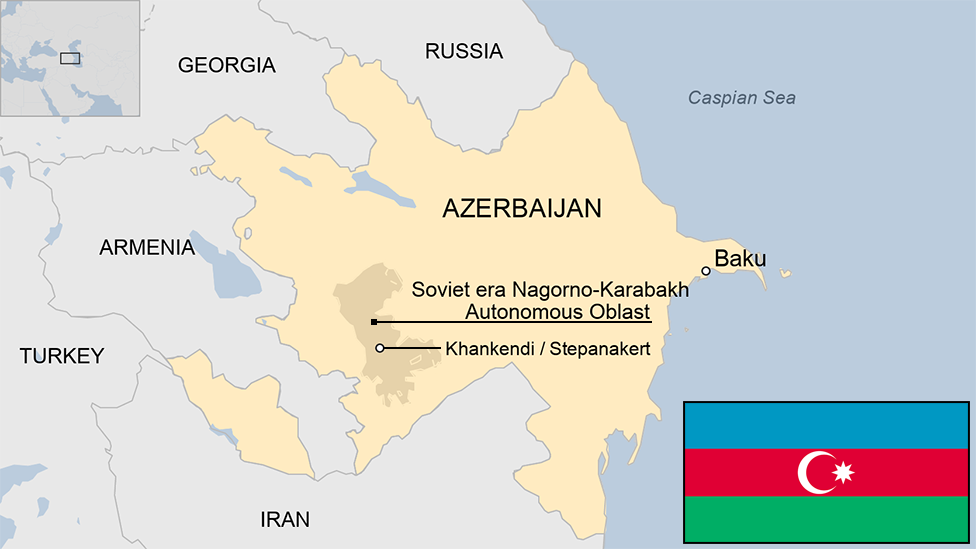
- Published30 January 2024
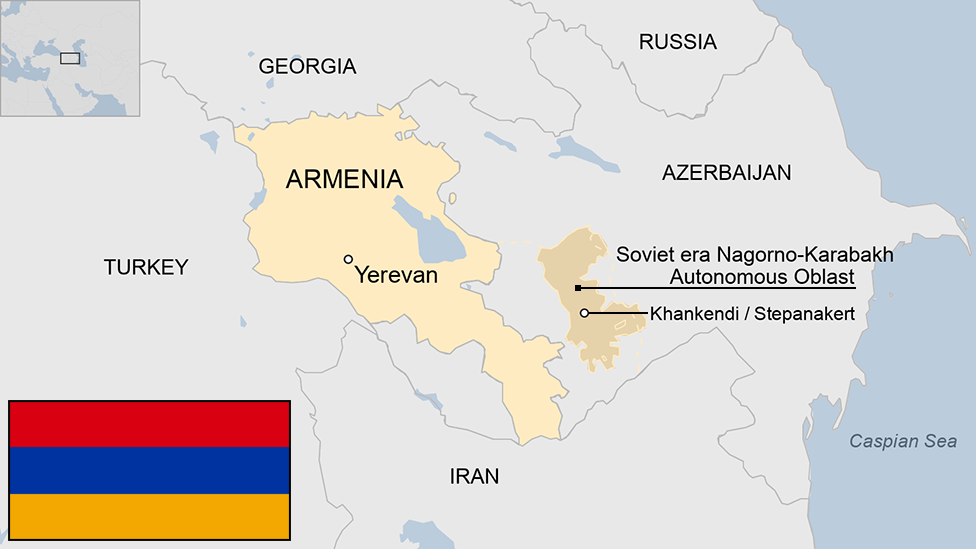
- Published22 August 2023
